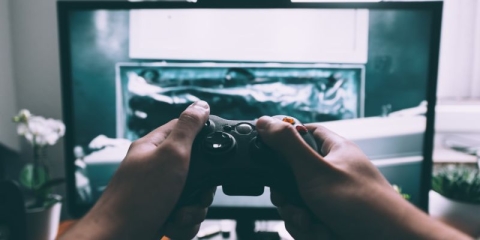

New study finds gamers would welcome a human-like avatar which can think, act and interact with the gamer to improve their performance
6 April 2021
3 min read
The gaming industry should embrace the use of AI-powered avatars to enhance gamers’ experience, according to new research from the University of Portsmouth.
The study suggests that experienced gamers would welcome expressing themselves in the virtual world through a human-like avatar which can think, act and interact with the gamer to improve their performance.
Co-authored by Dr Muhammad Awais Shakir Goraya, senior lecturer in operations and systems management from the Faculty of Business and Law, the research found that AI-powered avatars would give gamers an experience as close to reality as possible.
Dr Awais Shakir Goraya said: “The pandemic has been a technological game changer for many of us because we have seen a digital transformation, with the likes of AI, virtual reality (VR), Internet of Things (IoT) and Blockchain, becoming more commonplace.
“People are running marathons virtually, we can meet colleagues in Australia and use VR to feel like you’re in the same room. The world is fast becoming digitised and modernised, and AI is used in so many things we use in everyday life – from online browsing to our shopping journeys on varied platforms.
“AI has already altered the multi-billion pound gaming industry, but our research has found gamers want to be fully immersed inside the game to get the best possible experience. Using an AI-powered avatar would allow a customised, interactive experience, which would be more enjoyable for the gamer.”
The research surveyed 500 people - mostly students - from China who were gaming every day on smartphones and personal computers. At least 20 percent of them were gaming for three to six hours daily.
The study explored whether gamers think an AI-powered avatar - which could offer guidance, improve performance, speed and combat - would be easy, useful and enjoyable.
Dr Awais Shakir Goraya said: “Ultimately, consumers use a product or service if they find it easy and useful, so predicting that AI-powered avatars would be beneficial for gamers shows that it’s likely to be successful in the marketplace.
“This research is just a starting point to guide the gaming industry, but it could also have implications for other industries such as retail, hospitality, logistics and aviation. The pandemic has really forced us to shine a spotlight on what is possible using this technology, and what might come next.”
The paper ‘Let's play: Me and my AI-powered avatar as one team’ is published in Psychology and Marketing.
This research is just a starting point to guide the gaming industry, but it could also have implications for other industries such as retail, hospitality, logistics and aviation.
Dr Muhammad Awais Shakir Goraya, Senior lecturer in operations and systems management
“AI has already altered the multi-billion pound gaming industry, but our research has found gamers want to be fully immersed inside the game to get the best possible experience. Using an AI-powered avatar would allow a customised, interactive experience, which would be more enjoyable for the gamer.”
The research surveyed 500 people - mostly students - from China who were gaming every day on smartphones and personal computers. At least 20 percent of them were gaming for three to six hours daily.
The study explored whether gamers think an AI-powered avatar - which could offer guidance, improve performance, speed and combat - would be easy, useful and enjoyable.
Dr Awais Shakir Goraya said: “Ultimately, consumers use a product or service if they find it easy and useful, so predicting that AI-powered avatars would be beneficial for gamers shows that it’s likely to be successful in the marketplace.
“This research is just a starting point to guide the gaming industry, but it could also have implications for other industries such as retail, hospitality, logistics and aviation. The pandemic has really forced us to shine a spotlight on what is possible using this technology, and what might come next.”
The paper ‘Let's play: Me and my AI-powered avatar as one team’ is published in Psychology and Marketing.
